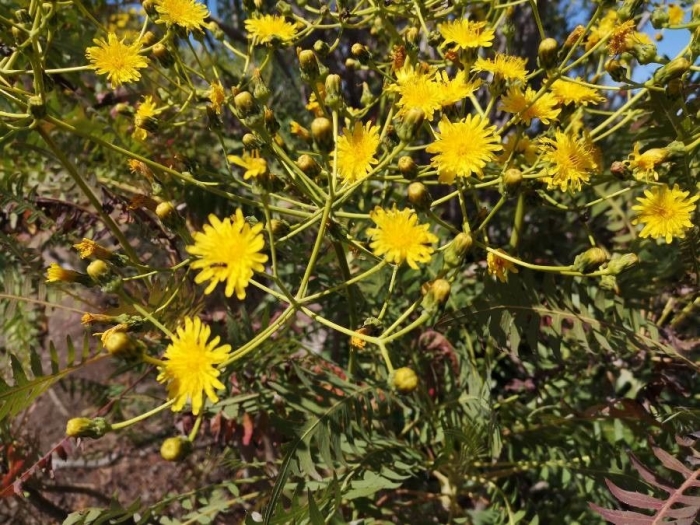Canary Island Sow-Thistle
(Sonchus canariensis)
Canary Island Sow-Thistle (Sonchus canariensis)
/
/

Udo Herkommer
CC BY-SA 4.0
Image By:
Udo Herkommer
Recorded By:
Copyright:
CC BY-SA 4.0
Copyright Notice:
Photo by: Udo Herkommer | License Type: CC BY-SA 4.0 | License URL: https://creativecommons.org/licenses/by-sa/4.0/ | Attribution: Udo Herkommer (cc-by-sa) | Rights Holder: Udo Herkommer | Publisher: PlantNet | Date Created: 2020-02-20T13:50Z | Title: Sonchus canariensis (Sch.Bip.) Boulos: flower | Notes: |
















Estimated Native Range
Summary
Sonchus canariensis, commonly known as Canary Island Sow-thistle or Tree Sonchus, is a perennial herb native to the laurel forests and craggy areas of the Canary Islands. This species typically forms a shrub-like structure with a thick, woody stem, reaching heights of up to 3 meters. The leaves of Sonchus canariensis are a distinctive feature, arranged in a terminal rosette on the branches, with pinnatisect leaves that have narrow foliar lobes, giving them a deeply lobed appearance. It produces showy inflorescences of capitula that are wide, up to 1.5 cm in diameter, with flowers that exhibit shades of blue, green, and yellow during the spring season.
The Canary Island Sow-thistle is valued for its unique appearance and is often used in ornamental plantings in subtropical and Mediterranean climates. It is drought-tolerant, making it suitable for xeriscaping and gardens with low water availability. While it thrives in full sun to part shade, it prefers well-drained soils and can tolerate a range of soil types, from sandy to loamy. It is not commonly known to suffer from significant disease or pest issues, but it can be sensitive to overwatering, which may lead to root rot. Gardeners should be aware that, in some regions, it can self-seed and become invasive if not properly managed.CC BY-SA 4.0
The Canary Island Sow-thistle is valued for its unique appearance and is often used in ornamental plantings in subtropical and Mediterranean climates. It is drought-tolerant, making it suitable for xeriscaping and gardens with low water availability. While it thrives in full sun to part shade, it prefers well-drained soils and can tolerate a range of soil types, from sandy to loamy. It is not commonly known to suffer from significant disease or pest issues, but it can be sensitive to overwatering, which may lead to root rot. Gardeners should be aware that, in some regions, it can self-seed and become invasive if not properly managed.CC BY-SA 4.0
Plant Description
- Plant Type: Shrub
- Height: 4-8 feet
- Width: 4-5 feet
- Growth Rate: Moderate
- Flower Color: Yellow
- Flowering Season: Spring
- Leaf Retention: Semi-Deciduous
Growth Requirements
- Sun: Full Sun, Part Shade
- Water: Low, Medium
- Drainage: Medium
Common Uses
Bird Garden, Butterfly Garden, Edible*Disclaimer: Easyscape's listed plant edibility is for informational use. Always verify the safety and proper identification of any plant before consumption., Low Maintenance
Natural Habitat
Native to the laurel forests and craggy areas of the Canary Islands
Other Names
Common Names:
Scientific Names: , Sonchus canariensis, Sonchus pinnatus var. canariensis,
GBIF Accepted Name: Sonchus canariensis (Sch.Bip.) Boulos